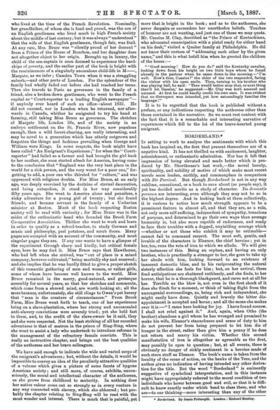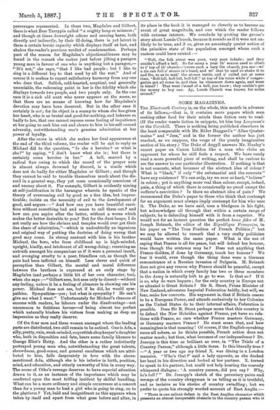BORDERLAND.*
IN setting to work to analyse the sentiments with which this book has inspired ns, the first that present themselves are of a negative kind. It has not thrilled ns with excitement, laughter, astonishment, or enthusiastic admiration. Nor has it left that impression of being elevated and made better which is pro- duced by Mr. Shorthonse's last work,—the moral beauty, spirituality, and nobility of motive of which make most recent novels seem leaden, earthly, and commonplace in comparison with Sir Percival. But though Borderland is not in any way sublime, sensational, or a book to rave about (as people say), it yet has decided merits ae a study of character. Its dramatis persona are interesting, even although they may not be so in the highest degree. And in looking back at them collectively, it is curious to notice how much strength appears to be a prominent feature in almost all, and that they are, as a rule, not only more self-sufficing, independent of sympathy, tenacious of purpose, and determined to go their own ways than average humanity is, bat also more capable of endurance, and ready to face their troubles with a dogged, unyielding courage which —whether or not those who exhibit it may be estimable— cannot fail to command respect. The most soft, gentle, and lovable of the characters is Eleanor, the chief heroine ; yet in her, too, runs the vein of iron to which we allude. We will give two instances of this. Being an orphan, and having an only brother, who is practically a stranger to her, she goes to take up her abode with him, looking forward to an existence of innocent domestic bliss, and to his reciprocating the natural sisterly affection she feels for him ; but, on her arrival, these fond anticipations are shattered ruthlessly, and she finds, to her horror, that he is a thorough blackguard, and cares not at all for her. Terrible as the blow is, not even in the first shock of it does she flinch for a moment, or think of taking flight from the uncongenial surroundings, as, being rich and independent, she might easily have done. Qaietly and bravely the bitter dis- appointment is accepted and borne ; and all the moan she makes over it is —" I came here looking for joy. I have found sorrow. I shall not rebel against it." And, again, when Otho (the brother) abandons a girl whom he has wronged and promised to make his wife, Eleanor's staunchness and sense of duty to him do not prevent her from being prepared to let bim die of hanger in the street, rather than give him a penny if he does not return and marry his victim. Whether this second manifestation of iron is altogether as agreeable as the first, may possibly be open to question ; but, at all events, there is obviously no danger of sickly sentiment in a heroine made of such stern stuff as Eleanor. The book's name is taken from the locality of the scene of action, on the banks of the Tees, and the author gives no indication of having intended any other deriva- tion for the title. But the word " Borderland" is eminently suggestive of symbolical interpretation, and in this instance might have appropriately referred to the moral condition of two individuals who hover between good and evil, so that it is diffi- cult to know exactly under which head to class them, and who are—to our thinking—more interesting than any of the other
• Borderland. By Jeanie Fothergilh Landoll Richard Bentley.
personages represented. In these two, Magdalen and Gilbert, there is what Brer Tarrypin called a mighty heap er mixnesa ;" and though at times downright odious and causing harm, both directly and indirectly, by their ill-doing, there is yet latent in them a certain heroic capacity which displays itself at last, and shakes the reader's previous verdict of condemnation. Perhaps part of the reason for Magdalen's objectionableness may be found in the remark she makes just before jilting a paragon young man in favour of one who is anything but a paragon,— "It's not," she says, "that I like bad people ; but I like to sing in a different key to that used by all the rest." And of course it is useless to expect satisfactory harmony from any one who does that. Selfish, cold-hearted, sceptical, and generally nnamiable, the redeeming point in her is the fidelity which she displays towards two people, and two people only. In the one case it is a sick old aunt who never appears on the scene, so that there are no means of knowing how far Magdalen's devotion may have been deserved. But in the other case it certainly is not; for its object is a scamp to whom she has given her heart, who is no brutal and good-for-nothing, and behaves so badly to her, that one cannot repress some feeling of impatience at her going to seek him out and cleave to him in his self-caused adversity, notwithstanding one's genuine admiration at her power of loyalty.
After the scene in which she makes her final appearance at the end of the third volume, the reader will be apt to reply as Michael did to the question, "Is she a heroine or what is she ?" by saying, "I don't know what she is ; but there is certainly some heroine in her." A. bell, marred by a radical flaw owing to which the sound of the proper note is almost always drowned by discord, is a simile which does not do badly for either Magdalen or Gilbert ; and though they cannot be said to trouble themselves much about the dis- cord in a general way, they yet seem occasionally conscious of and uneasy about it. For example, Gilbert is evidently aiming at self-justification in the harangue wherein he speaks of the theory of overcoming evil by good as a fine idea, but imprac- ticable; insists on the necessity of evil to the development of good, and argues :—" And how can you have beautiful sacri- fices without something bad and mean to call them out ? and how can you aspire after the better, without a worse which makes the better desirable to you? But for the dust-heaps, I do not really see how the shrines and temples would ever get their due share of admiration,"—which is undoubtedly an ingenious and original way of putting the doctrine of doing wrong that good may come. In strong contrast with him is his brother Michael, the hero, who from childhood np is high-minded, upright, kindly, and intolerant of all wrong-doing ; resenting an untruth amongst his companions as if it were a personal insult, and avenging cruelty to a poor, friendless cat, as though the pain had been inflicted on himself. Lees clever and quick of perception than Gilbert, the mental and moral difference between the brothers is expressed at an early stage by Magdalen (and perhaps a little bit of her own character, too), when she says :—"Gilbert sees, but sees only to dissect—without any feeling, unless it be a feeling of pleasure in showing one his power. Michael does not see, but if he did, he would sym- pathise. Sympathise—yes ; but what is sympathy ? He can't give me what I want." Unfortunately for Michael's chances of success with readers, he labours under the disadvantage—not uncommon to fictitious heroes—of being almost too perfect which naturally hinders his virtues from making as deep an impression as they really deserve.
Of the four men and three women amongst whom the leading parte are distributed, two still remain to be noticed. One is Ada, a silly,pretty, vain, weak-minded, coquettish shopkeeper's daughter who, both in disposition and fate, bears some family likeness to George Eliot's Hotly. And the other is a rather indistinctly portrayed young man who, notwithstanding the great talents, shrewdness, good-sense, and general excellence which are attri- buted to him, falls desperately in love with the above- mentioned Ada, although she is his inferior in birth, position, mind, and education, and utterly unworthy of him in every way. The scene of Otho's revenge deserves to have especial attention drawn to it, as an instance of the importance which may be conferred upon the most trifling incident by skilful handling. What can be a more ordinary and simple occurrence at a concert than for a yonng man to lead a girl who is going to sing, on to the platform P Yet, bald and insignificant as this appears when taken by itself and apart, from what goes before and after, in
its place in the book it is managed so cleverly as to become an event of great magnitude, and one which the reader follows with extreme interest. We conclude by quoting the groom's- story about Lands Church, because it sounds as if it were not un- likely to be true, and if so, gives an amusingly quaint notion of the primitive state of the population amongst whom such a custom could have existed :—
" Well, the folk about was poor, vary poor indade ; and they couldn't afford a bell. So for many a year th' sexton used to climb to t' top of th' church—'twere such a vary lile church, you sea—wi' a tin can full o' stones toe hand, and wi' that be used to shake it to and fro, so as to mak' the stones rattle, and a' called out at same time, 'Boll-loll, boll-loll, boll-loll!' at top of his voice while t' congre- gation got all come in, and then he clammert down again, and went in hissel' ! That were i'atead of a bell, you know ; they couldn't get the money to buy one. Ay, Lands Church was known for miles. around."



































 Previous page
Previous page